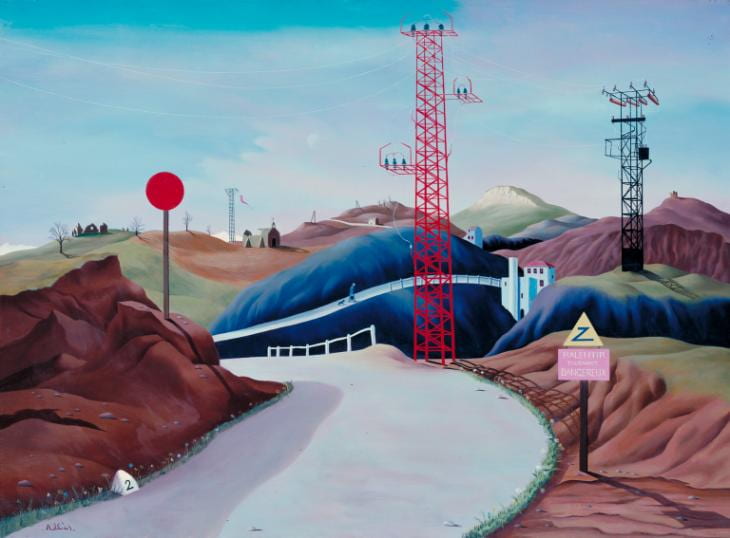Project Lead: Adalberto Lonardi and Katharina Siegel
Number of participants: 20
Duration: 5 days
Project Outline:
This is a walking-based project led by 2019-20 co-presidents Adalberto Lonardi (MA Interior Design) and Katharina Siegel (MA Sculpture), following on from the Walkative Across RCA projects led by Simon King and Jaspar Joseph-Lester between 2013-15 which evolved into the student-led Walkative Society http://thewalkativeproject.org/
Psychogeographic research has its roots in the arts or at the point of a junction where art, architecture, geography, psychology, and philosophy intersect. The term was initially influenced by The Situationist International, a left-wing, avant-garde group of European artists and intellectuals founded in 1957. If psychogeography investigates what influence the architectural or geographical environment has on perception, mental experience and behavior, we can ask what are the characteristics of structures by which we are surrounded on a daily basis – the visible and invisible infrastructures of cities like London.
The workshop will have as its outcome the publication and exhibition of 3 to 4 group projects. Input will be in the form of guest presentations that, inter alia, provide a history of psychogeography and art movements that explored ways of unleashing the subconscious imagination. From this, we pose a question: how do different places make us feel and behave? Groups will take this question as a starting point for their own research walking. Participants will be mapping an area of London taking into consideration modern or future social patterns. In collaboration with RCA graphic designer, José Garcia we will communicate the works in a self-published fanzine.
Invited guests:
Tom Spooner is a London-based illustrator and artist. Graduating from the Royal College of Art in 2016 and long-time contributor to The Walkative Project, he is interested in current debates concerning what constitutes psychogeography today and whether the term is misused i.e. is it a politically-charged critical walking practice that was developed as a means to an end (a revolution in the case of the situationists), or is it today a more free-floating form of walking that effectively functions as an end in itself?
Katharina Siegel is interested in phenomena of urban and landscape transformation, in questions of how architecture constitutes power and historical narratives and how individuals perceive (the urban) space. The possibility of perceiving various phenomena is dependent on pace and sometimes they only become visible in moments of deceleration. Walking or wandering through urban spaces as an artistic strategy of mapping is of great interest to her. She believes that there is an interaction between aesthetic reception and aesthetic production that manifests itself in the process as an aesthetic experience of presence (Präsenzerfahrung). The prerequisite here is a perceptive capacity that is freed from the search for knowledge gain in the scientific sense and opens up a space of reflection.

Timetable:
Day 1: Monday 4th November: UNDERSTAND
AM
– Introduction to the theme of `infrastructure` in relation to a psychogeographic orientation to city walking.
– Guest presentation: an overview of psychogeography (Tom Spooner).
PM
– Working session: groups of 4-5 students individually develop a method of mapping.
– Group Tutorials.
Day 2: Tuesday 5th November: RECORD
AM
-Walk led by Simon King and Jaspar Joseph’Lester: ´Parallel Urbanisms: Los Angeles in Whitechapel´. Artist Jaspar Joseph-Lester and writer Simon King will lead a semi-fictionalised walk, which explores elements of Los Angeles in the East End. The walk will draw from the publication ‘Parallel Urbanisms: London-Los Angeles’, which they recently co-edited with Norman M. Klein and Harriet Edwards. Meeting point: Whitechapel Gallery.
PM
– Participants in groups walking around their chosen areas recording, gathering material in the form of field notes and digital documentation e.g. still and moving image
Day 3: Wednesday 6th November: PRODUCE
AM
Guest Presentation: A Concept of Translation – Katharina Siegel
Sound Sensory Experience: unleash feelings through hearing – Adalberto Lonardi
– Presenting material gathered and recorded.
– Individual work development continuing during the PM.
Day 4: Thursday 7th November: PRODUCE
AM & PM
– Participants will then work collaboratively with RCA graphic designer José Garcia to edit their contributions to the final publication.
– Editing & printing final publication.
Day 5: Friday 8th November: PRESENT
PM
– Distribution of the publications, which will act as the final outcome from the week’s workshop (each participant will receive a hard copy of their publication).
– Presentation: Each group will present their work and publications from the week.